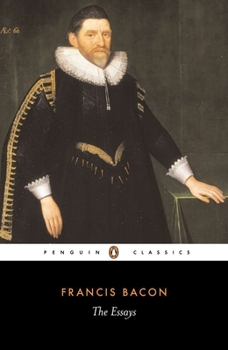The Essays
Select Format
Select Condition 
Book Overview
The genius of Francis Bacon is nowhere better revealed than in his essays. Bacon's education was grounded in the classical texts of ancient Greece and Rome, but he brought vividness and color to the arid scholasticism of medieval book-learning. Whatever their subject, whether it is something as personal as "Friendship" or as abstract as "Truth," the essays combine a mixture of rhetoric and philosophy; and are perhaps the most complete and...
Format:Paperback
Language:English
ISBN:0140432167
ISBN13:9780140432169
Release Date:January 1986
Publisher:Penguin Group
Length:288 Pages
Weight:0.50 lbs.
Dimensions:0.7" x 5.1" x 7.8"
Age Range:18 years and up
Grade Range:Postsecondary and higher
Customer Reviews
5 ratings
Academic yet Enriching!
Published by Thriftbooks.com User , 19 years ago
Bold statements are made in these essays - essentially changing the way man thought about his universe. A great study in scientific thought and materialism.
Recommended reading, but footnotes excessive in this edition
Published by Thriftbooks.com User , 20 years ago
Francis Bacon was an observant and insightful student of human society and human nature, as reflected in most of the essays here. The perspective *is* a bit bourgeois, but I guess Bacon can't help having been a nobleman. A lot of the later essays in the book seem to be along the lines of "how to put people to good use." Included also in this volume is a quite detailed biographical sketch at the beginning, and some extra material with aphoristic sketch-like versions of a few of the essays, plus the "Antitheses of Things," which is quite interesting.The language is essentially Shakespearean, which I always enjoy reading, as it gives one the sense of watching as phrases and words are coined before your eyes (Shakespeare coined INNUMERABLE words and phrases in his works, and Bacon does a few here too, actually, according to the Explanatory Notes); a refreshing change from modern language, where we basically speak in cliches. The problem is, this edition (Oxford's World's Classics) has SO MANY "translational" footnotes explaining his 17th-century word usage, that it's quite distracting and unnecessary. One has to learn to basically ignore them most of the time. The Explanatory Notes collected at the end are quite indispensable for dealing with Bacon's penchant for endless streams of Latin quotes and likely-obscure-to-the-modern-reader classical references, but the footnotes are just ridiculous. I'd guess one could reasonably assume that anyone who'd pick up this book in the first place would not need to be told that "contrariwise" means "on the contrary," "mark" means "observe," "magnanimity" means "noble, generous feelings," "overlaid" means "burdened"... I could go on and on. I don't know if other editions have as thorough Explanatory Notes as this, though; if they do I'd go with that over this edition.
Essential
Published by Thriftbooks.com User , 21 years ago
There are few writers I have read in my entire life who have taught me more than Francis Bacon. These essays are simply essential.
The Renaissance Socrates
Published by Thriftbooks.com User , 22 years ago
It's useless to dig for just one or two epigrams to stand in for the totality of Bacon's penetrating genius in the "Essays." Though it is perhaps fashionable today to detract from him in order to praise Montaigne, it should be clear that Bacon is at least as indispensable. As terse as Emerson is expansive, Bacon's "Essays" are perhaps the most truly Classical (in spirit) prose in the English language. Fans of the Leo Strauss school should have a fieldday reading between the lines of the essays "On Atheism" and "On Superstition"; for the rest of us, nobody can come away from even one of these essays without gaining invaluable insights. Though Bacon is rightly heralded for the radical newness of his pragmatic methods, he is ensteeped in history-- those mindful of Napoleon's dictum that history is the only true philosophy will certainly respond enthusiastically to Bacon's approach. From the post-Machiavellian insights of "Of Empire" to the pre-Enlightenment ethics of "Of Goodness and Goodness of Nature", one will find in reading Bacon's prose what the youth of Athens must have found in following Socrates: the presence of a benevolent, worldly-wise, supremely rational mind determined to show you the order of the world.
a timeless classic
Published by Thriftbooks.com User , 24 years ago
Along with Shakespeare's works, Bacon's "Essays" is the supreme achievement of the English Renaissance. Philosopher, statesman, author, Bacon made all knowledge his province, and in the "Essays" is to be found more worldly wisdom than in any other book. "My essays come home, to men's business and bosoms." And Pope penned the epitaph, "If parts allure thee think how Bacon shined, The wisest, brightest, meanest of mankind." These essays, though, need a gloss for the modern reader to understand Bacon's cramped yet erudite prose and Latin quotations, as is provided in Pitcher's edition.






